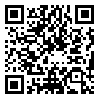Volume 18, Issue 4 (Winter 2024)
jmed 2024, 18(4): 617-626 |
Back to browse issues page
Download citation:
BibTeX | RIS | EndNote | Medlars | ProCite | Reference Manager | RefWorks
Send citation to:



BibTeX | RIS | EndNote | Medlars | ProCite | Reference Manager | RefWorks
Send citation to:
Zakerkish M, Hafezi A, Shakurnia A, Maniati M. Empathy Level and its Related Factors in the Different Specialties of Medical Residents. jmed 2024; 18 (4) :617-626
URL: http://jmed.ssu.ac.ir/article-1-1447-en.html
URL: http://jmed.ssu.ac.ir/article-1-1447-en.html
Ahvaz Jundishapur University of Medical Sciences , shakurnia@yahoo.com
Abstract: (1160 Views)
Introduction: Given the importance of empathy in the process of caring for patients, this study investigated the level of empathy and its associated factors among medical residents at Ahvaz Jundishapur University of Medical Sciences (AJUMS).
Method: This cross-sectional study was conducted at AJUMS in 2022. All 473 medical residents who were studying at AJUMS were included in the study using census method. Participants completed the Jefferson Scale of Physician Empathy. This scale has 20 items that are scored based on a 7-point Likert scale. Data were analyzed using independent t-test, ANOVA, and Pearson's correlation coefficient.
Results: The number of medical residents who completed the questionnaires was 290 (response rate 61.3%). These medical residents' mean score of empathy was 102.81±12.75 (out of a total of 140 points). Empathy scores had no statistically significant relationship with sex, marital status, and entry year (p˃ 0.05). Pearson's correlation coefficient showed that there is a significant relationship between the level of empathy and age (r=0.223, p=0.001). Also, there was a significant difference between the empathy scores of medical residents of different specialties (p=0.0001, F=5.249), with the psychiatry residents having the highest mean empathy score (118.31±6.1) and the ophthalmology residents having the lowest (92.85±14.2).
Conclusion: The findings showed that the empathy score of the residents is at a moderate level, and given the significant difference between the empathy scores of residents of different specialties, it can be argued that empathy changes under the influence of the clinical education environment and is a teachable skill.
Method: This cross-sectional study was conducted at AJUMS in 2022. All 473 medical residents who were studying at AJUMS were included in the study using census method. Participants completed the Jefferson Scale of Physician Empathy. This scale has 20 items that are scored based on a 7-point Likert scale. Data were analyzed using independent t-test, ANOVA, and Pearson's correlation coefficient.
Results: The number of medical residents who completed the questionnaires was 290 (response rate 61.3%). These medical residents' mean score of empathy was 102.81±12.75 (out of a total of 140 points). Empathy scores had no statistically significant relationship with sex, marital status, and entry year (p˃ 0.05). Pearson's correlation coefficient showed that there is a significant relationship between the level of empathy and age (r=0.223, p=0.001). Also, there was a significant difference between the empathy scores of medical residents of different specialties (p=0.0001, F=5.249), with the psychiatry residents having the highest mean empathy score (118.31±6.1) and the ophthalmology residents having the lowest (92.85±14.2).
Conclusion: The findings showed that the empathy score of the residents is at a moderate level, and given the significant difference between the empathy scores of residents of different specialties, it can be argued that empathy changes under the influence of the clinical education environment and is a teachable skill.
Type of Study: Research |
Subject:
Medical Education
Received: 2023/09/5 | Accepted: 2023/12/19 | Published: 2024/03/16
Received: 2023/09/5 | Accepted: 2023/12/19 | Published: 2024/03/16
Send email to the article author
| Rights and permissions | |
 |
This work is licensed under a Creative Commons Attribution-NonCommercial 4.0 International License. |







